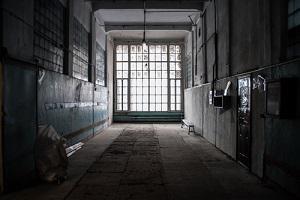 The town of Preston, Connecticut, is home to a site popular among enthusiasts of the strange and paranormal. The crumbling remains of an asylum—most recently known as the Norwich State Hospital, but once called The Norwich Hospital for the Insane—have been used as a backdrop for haunted house reality television shows and as a project for paranormal investigators. Apart from being scary and disturbing, the abandoned asylum—which closed in 1996—begs an altogether different question. If asylums were once common throughout the country as a home or care facility for the mentally ill, what are we doing with such individuals now that most such facilities are closing? The answer, according to many, seems to be that we are simply holding them in different institutions now—institutions known as correctional facilities or prisons.
The town of Preston, Connecticut, is home to a site popular among enthusiasts of the strange and paranormal. The crumbling remains of an asylum—most recently known as the Norwich State Hospital, but once called The Norwich Hospital for the Insane—have been used as a backdrop for haunted house reality television shows and as a project for paranormal investigators. Apart from being scary and disturbing, the abandoned asylum—which closed in 1996—begs an altogether different question. If asylums were once common throughout the country as a home or care facility for the mentally ill, what are we doing with such individuals now that most such facilities are closing? The answer, according to many, seems to be that we are simply holding them in different institutions now—institutions known as correctional facilities or prisons.
Staggering Estimates
According to data collected by the Treatment Advocacy Center (TAC), a nonprofit organization which helps the mentally ill get the treatment they need, the American prison system currently houses more inmates with severe mental illness than are in state psychiatric hospitals—and the numbers are not even close. The TAC reported that in 2012, more than 350,000 inmates with severe mental illness were incarcerated, but only about 35,000 severely mentally patients were under the care of state hospitals.
Lack of Treatment
While the numbers are certainly sobering, the problems only get worse from there. Prior to a defendant going to trial, there is often talk, and even testing, to be sure that he or she is mentally competent. Once the determination is made, however, little attention—if any—is paid to the defendant’s ongoing condition, especially if he or she is convicted.
Prisons generally offer very few mental health or counseling services, and an inmate receiving psychiatric medications is not very likely. Instead, correctional facilities often resort to more draconian attempts to control behavior such as solitary confinement and restraints. Unsurprisingly, such techniques are not very effective, and suicide attempts among mentally ill inmates are tragically common.
New Approaches
Over the past several years, Connecticut Governor Dannel Malloy has been recognized throughout the country for his efforts at criminal justice reform. He has stated his intent to significantly reduce the prison population in the state and to place a renewed focus on education and rehabilitation as opposed to punishment. His proposals have included reducing or eliminating bail for low-risk offenders, such as those who are mentally ill, keeping them out of jail while awaiting trial. He has also pushed for increased services to inmates and a decrease in the use of solitary confinement with the state prison system. While the overall effect has yet to be seen, the state of Connecticut appears to be heading in a better direction than much of the country.
If you or a loved one has been arrested on criminal charges, an experienced Hartford criminal defense attorney can help limit the impact to your future. Call 860-290-8690 to schedule a confidential consultation at the Woolf Law Firm, LLC. We will help you explore your available options and work to ensure that your rights are fully protected throughout the process.
Sources:
http://www.slate.com/articles/news_and_politics/jurisprudence/2016/01/prisons_have_become_warehouses_for_the_mentally_ill.html
http://www.treatmentadvocacycenter.org/about-us
https://www.washingtonpost.com/news/wonk/wp/2015/04/30/a-shocking-number-of-mentally-ill-americans-end-up-in-prisons-instead-of-psychiatric-hospitals/
http://www.courant.com/politics/hc-second-chance-malloy-20160128-story.html
 50 Founders Plaza
50 Founders Plaza

